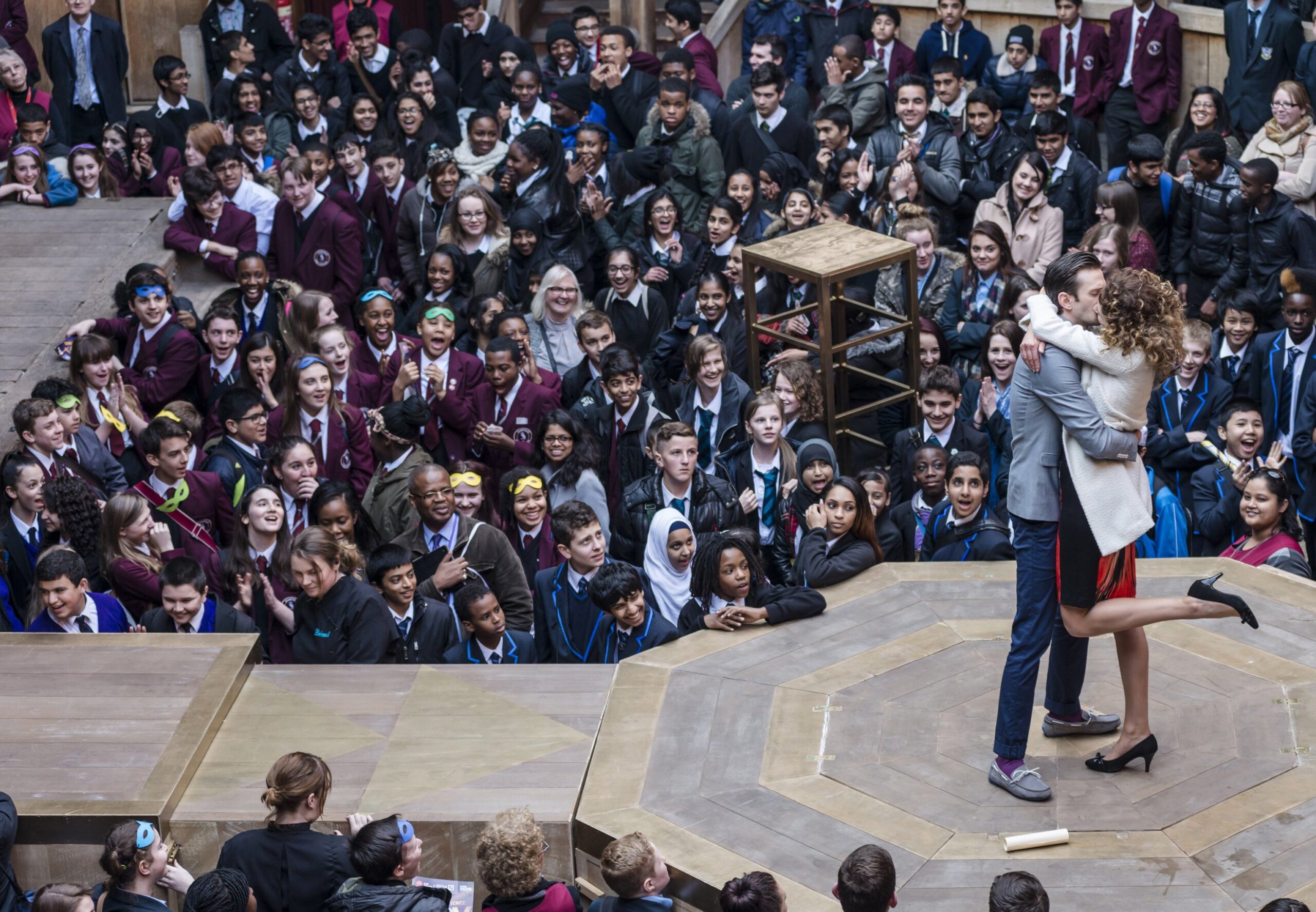
Photo: Amit Lennon
Meeting Shakespeare
Georghia Ellinas reveals how Shakespeare’s Globe helps teachers to explore the full relevance of the Bard’s plays to young people.
The requirement to teach Shakespeare has been with us since the first National Curriculum in 1988 and Shakespeare is the only named author in the revised 2015 National Curriculum at both Key Stages 3 and 4. While many teachers are comfortable with approaching the play as a performance text, not all teachers have had training in using drama approaches and some feel more comfortable treating the play as a novel, approaching it in the same way as they do Pride and Prejudice. Faced with pages of verse, no wonder a ‘Shakes-fear’ is often instilled – in teachers as well as students.
The arts ought to be appreciated, as much as possible, in the medium for which they were created. If Shakespeare is to be more than an exam question about a seemingly lifeless cultural monument, we must continue to find and fund ways that allow students to meet Shakespeare as he intended and to discover the plays’ richness through speaking the words aloud and seeing them being performed.
We share teachers’ ambition to make studying Shakespeare an exciting and relevant experience for students
The Shakespeare’s Globe’s annual education project, Playing Shakespeare with Deutsche Bank is celebrating its tenth year in 2016, the 400th anniversary of Shakespeare’s death. The project gives over 17,000 free tickets each year to state school students in London and, as of 2014 to Birmingham too, to come to the Globe and watch a Shakespeare play specifically produced for young people. Vitally, Shakespeare’s language is retained and the students witness how relevant the stories are today. By the end of next year’s production, the partnership with Deutsche Bank will have allowed over 117,000 students to experience live Shakespeare for free. For many of them this will have been their first experience of live theatre, let alone Shakespeare.
Crucial to the project is the integrated training for teachers. We hold twilight sessions at the theatre where teachers, who will be bringing their students to the live production later in the project, learn from Globe Education practitioners active, drama-based approaches to teaching the play in the classroom. In this way, we ensure the trip to the theatre is not an isolated event. The performance is contextualised, their learning comes full circle and the experience will continue in the life of the students and the school. One of the best ways of ensuring this is through whole-department training, something we encourage in our courses of continuing professional development (CPD). When a department trains together, the team is strengthened. They are familiar with their own context and can shape the training to their needs and the needs of their students. Consistency and coherence in practice, so hard to achieve, are more likely when teachers have shared the same experience and been party to the same discussions.
An important role for arts organisations is to show how arts can help address issues in school life. Shakespeare’s plays contain themes of huge relevance to students’ spiritual, moral, social and cultural development. The plays explore those emotions to which we are all prey – suspicion, jealousy, ambition and the desire for revenge. They also offer dynamic opportunities to consider a character’s actions and offer their opinions on wrong and right actions. For example, the treatment of Malvolio in Twelfth Night could be seen as an amusing practical joke on a puritanical and irritating man, or calculated bullying of a hard-working and loyal employee.
In 2013, we worked with the Hackney Learning Trust (HLT, part of Hackney Council in London) to create Dare to Play. The project responds to research that showed that the transition period between primary and secondary schools is particularly stressful for children, often resulting in a slowing down of pupils’ progress and disenchantment during the first term with their new school. HLT wanted to address this issue in its schools and approached us. By working together towards a performance of a Shakespeare play, stronger academic and social links are made between primary and secondary school teachers, their pupils and the Year 6 and Year 7 English curriculum.
HLT recruited two schools to take part in the pilot year, a secondary and a feeder primary. Juliet Cook, Head of English at Stoke Newington School, said: “The project provided an excellent opportunity to develop creative teaching practices as well as helping our incoming students. It showed us how Shakespeare can be used creatively to offer a stimulating start to secondary school, not just in English but across the board.” Initially funded by HLT, the schools have found Dare to Play so successful that they are now funding it themselves. It has trebled in size in three years.
We share teachers’ ambition to make studying Shakespeare an exciting and relevant experience for students. By using the actual approaches developed by actors who’ve spoken these words from the stage and in the rehearsal rooms, we unlock the plays and students will come to enjoy Shakespeare. We want Shakespeare to play a part in students’ lives beyond school. Just as we want students to read for pleasure when they have left school, we want them to return to Shakespeare to relish how different productions, as with any artform, can entertain, delight and challenge them.
Georghia Ellinas is Head of Learning, Globe Education at Shakespeare’s Globe.
www.shakespearesglobe.com
Join the Discussion
You must be logged in to post a comment.